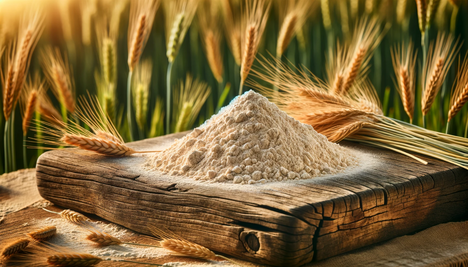Wholemeal rye flour

What is wholemeal rye flour?
Wholemeal rye flour is made from the whole grain of rye by grinding the entire grain - including the germ, husk and endosperm. Compared to white flour, where the germ and husk are removed, wholemeal flour retains a higher proportion of nutrients, fiber and minerals. Rye itself is a grain known for its hardy nature and thrives in colder climates.
Introduction: Wholemeal rye flour in dog nutrition
The debate about cereals in dog food is complex and controversial. While some experts advocate avoiding grains altogether, others see them as a valuable source of nutrients and energy. Whole rye flour is an interesting option in this context, offering potential health benefits but also requiring some consideration before adding it to your dog's diet.
Benefits of whole rye flour for dogs
Rich in fiber
Whole rye flour is an excellent source of fiber, which can help support digestive health. Fiber helps keep the digestive system moving and can be helpful in preventing constipation.
Nutrient-rich
Unlike processed white flour, whole rye flour retains most of the nutrients of the whole grain. These include B vitamins, iron, magnesium and zinc, all of which support important functions in your dog's body.
Potential health benefits
Some studies suggest that whole grains, including rye, may reduce the risk of chronic disease and help maintain a healthy body weight. However, these effects have primarily been observed in humans and require further research in the context of dog nutrition.
Disadvantages and considerations
Contains gluten
Rye contains gluten, which can cause allergies or intolerances in some dogs. Symptoms of gluten intolerance can include digestive disorders, skin problems and behavioral changes.
High in calories
Whole rye flour is relatively high in calories, which should be taken into account when feeding dogs with a tendency to be overweight. Overall calorie intake should be monitored to ensure healthy weight control.
Potential influence on thyroid function
There is evidence that certain components in rye may interfere with the absorption of iodine, which in turn could affect thyroid function. This is particularly worth considering for dogs with thyroid problems.
Whole rye flour, eaten in moderation, can be a nutritious addition to your dog's diet. The benefits, such as a high fiber content and a variety of nutrients, make it an ingredient worth considering. However, it's important not to overlook the potential drawbacks, including the possibility of gluten intolerance and the impact on thyroid function.
If you notice any signs of hypersensitivity or poisoning in your dog, you should see your vet immediately. We are not a substitute for a vet, but we try to be as accurate as possible. Every dog reacts differently and we recommend you get a second opinion or consult your vet if in doubt.
Stay healthy and take good care of your four-legged friend!😊